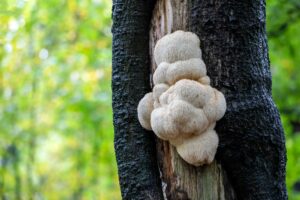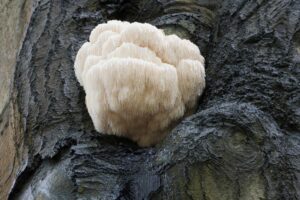Lion’s Mane Mushroom, also known as Hericium erinaceus, is a medicinal mushroom that has been used for centuries in traditional Chinese medicine. It is known for its unique appearance, which resembles a lion’s mane, and its health-promoting properties.
Recent research has shown that Lion’s Mane Mushroom may have a positive effect on the brain and nervous system, including the potential to increase serotonin levels. In this post, we will take a closer look at the scientific evidence behind these claims and explore the potential benefits of Lion’s Mane Mushroom for brain health.
What is serotonin?
Serotonin is a chemical messenger or neurotransmitter that is produced in the brain and gut. It plays an important role in regulating mood, sleep, and appetite. Low levels of serotonin have been linked to depression, anxiety, and insomnia.

How does Lion’s Mane Mushroom affect serotonin levels?
Lion’s Mane Mushroom contains a compound called hericystin, which has been shown to increase the production of nerve growth factor (NGF) in the brain. NGF is a protein that promotes the growth and survival of nerve cells, including those that produce serotonin.
One study, published in the Journal of Medicinal Food, found that participants who took a Lion’s Mane Mushroom supplement for four weeks had an increase in NGF levels and an improvement in mild cognitive impairment. Another study, published in the journal Phytotherapy Research, found that taking a Lion’s Mane Mushroom extract improved symptoms of anxiety and depression in people with major depressive disorder.
It’s also worth mentioning that Lion’s Mane Mushroom has also been found to have other compounds that may benefit cognitive function, such as hericystin and erinacines which helps to promote nerve growth, but their effects on serotonine are not well-established yet.
What are the potential benefits of Lion’s Mane Mushroom for brain health?
The potential effects of Lion’s Mane Mushroom on serotonin levels are just one of the ways it may be beneficial for brain health. The mushroom is also rich in antioxidants and anti-inflammatory compounds that protect brain cells from damage and inflammation.
In addition to these potential benefits, Lion’s Mane Mushroom has also been studied for its potential effects on memory and cognitive function. One study found that taking a Lion’s Mane Mushroom supplement for eight weeks improved memory and cognitive function in healthy older adults. Another study found that taking a Lion’s Mane Mushroom extract for 16 weeks improved cognitive function in people with mild cognitive impairment.
Can I use Lion’s Mane Mushroom to boost my serotonin levels?
While the studies on Lion’s Mane Mushroom and serotonin are promising, it’s important to remember that more research is needed to confirm these findings.
Under no circumstances should you use Lion’s Mane Mushroom as a sole treatment for depression or anxiety or treat any other medical condition. If you’re experiencing symptoms of low serotonin, you should talk to your doctor or healthcare provider.
You can incorporate Lion’s Mane Mushroom into your diet, either by adding an extract to smoothies or by taking a supplement. Of course, you can always try our drinks as well.
Lion’s Mane Mushroom may have the potential to increase serotonin levels, which may, in turn, have a positive effect on mood, sleep, and cognitive function. However, more research is needed to confirm these findings and to understand the mechanisms behind the potential effects of Lion’s Mane Mushroom on serotonin levels.
- “Enhancing effects of the mushroom Yamabushitake (Hericium erinaceus) on neutrophil functions in aged mice” Published in Journal of Medicinal Food
- “Hericium erinaceus Improves Mood and Sleep Quality in Healthy Adults: A Placebo-Controlled, Dose-Finding Study” Published in Complementary Therapies in Medicine
- “Efficacy of Hericium erinaceus in patients with major depressive disorder: A randomized, double-blind, placebo-controlled clinical trial” Published in Phytotherapy Research







